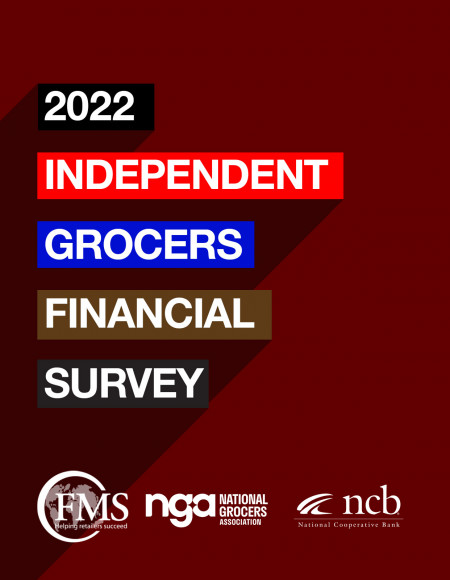New Survey Finds Triumph in a Tough Marketplace for Independent Grocers

FORT LAUDERDALE, Fla., July 28, 2022 (Newswire.com) - The 2022 edition of the Independent Grocers Financial Survey, a joint study between the National Grocers Association (NGA) and FMS Solutions, documents a complex 2021 where the only constant was change.
Reflecting record participation, 374 independent grocers representing nearly 2,000 stores shared their financial and operational data for fiscal year 2021, which runs through March 31, 2022. "While down from the incredible spikes in 2020, independent grocers' knowledge of the marketplace, grit and nimbleness resulted in the second-best year on record in terms of net profits before taxes," shared Robert Graybill, president and CEO of FMS Solutions.
The 2021 Marketplace
Grocery retailing remained in flux on both the supply and demand sides. Consumer spending and trips shifted between online and in-person closely related to the number of new COVID-19 cases. Inflation and out-of-stocks prompted shoppers to switch between items, sizes, brands and stores.
"Supply chain challenges kept independent retailers on their toes with historically low order fill rates averaging 74.6%," Graybill said. This was compounded by labor shortages, a complex regulatory environment and going up against the biggest year in grocery retailing. In the tough marketplace, independents focused on implementing loyalty programs to optimize trips and spending as reliance on the paper circular is dwindling.
Sales
Despite the inflationary environment, 58% of independent grocers were unable to match their 2020 sales records, though many came close. Same-store sales declined 1.7%, yet dollar sales dollars remained far ahead of the 2019 pre-pandemic levels. Center store represented nearly 61% of the business, as consumers remained focused on staples for home cooking while they looked for value. Different levels of inflation also influenced departmental contributions to sales as did the rampant out-of-stocks. "Independent grocers focused on inventory management amid high inflation and kept turns high," Graybill explained.
Margins and Profits
Managing inventory, inflation and demand resulted in independent retailers compressing their margins in key departments in 2021, including meat and produce. The total store margin dropped to 27.4% — down one percentage point versus 2020. Expenses rose to 28.7% of sales, back to 2019 levels, with labor and benefits averaging 15% of sales. Many retailers also experienced increases in utilities.
"Slightly lower sales and compressed margins combined with rising expenses meant a year-over-year decrease in the net profit before taxes and EBITDA ratios," Graybill explained. "However, this was to be expected in going up against profits that rose five fold in 2020. At 3.62%, the net profit before taxes for independent operators in 2021 was the second-best result on record."
The same goes for the industry average EBITDA of 5.66%. "Navigating these volatile times is a tremendous accomplishment that will help independents through tough 2022 marketplace conditions," said Greg Ferrara, NGA president and CEO.
The Profit Leaders
Each year, a group of retailers outperform the rest of the field by a wide margin. Reflecting the top 25th percentile of independent grocers when regarding net profits before taxes, they have become known as the profit leaders. "A review of their traits shows a relentless focus on efficiency and effectiveness," Graybill said.
With an average net profit before taxes of 10.1%, this group improved upon their 2020 performance with a focus on fresh, particularly produce and deli, higher margins, above-average transactions and bigger baskets. Operationally, profit leaders focus on shrink control and they reinvest in their businesses.
In summary, 2021 was a strong year despite the year-on-year declines. Inflation, higher costs of doing business, volume and unit declines, and prolonged marketplace volatility are expected. While 2022 is unlikely to bring the same results as 2020 and 2021, Ferrara said independents are prepared for the challenge. "For many years, independent grocers have proven to be resilient, creative and nimble," he said. "Strongly rooted in their communities, independents are well positioned to weather the perfect storm of supply chain, inflation and labor challenges."
The complete survey is available at www.nationalgrocers.org and www.fmssolutions.com.
FMS Solutions Holdings LLC (FMS) — Since 1974, FMS has helped independent retail grocers succeed by transforming historical accounting activities into timely, accurate decision support tools. The company's keen understanding of the challenges the industry faces has positioned it as the National Grocers Association's (NGA) preferred provider of industry benchmarking, best practices and mission-critical decision support. Headquartered in Florida, FMS has additional offices in Alabama, Minnesota, Missouri, Illinois, Pennsylvania, New Jersey, Maryland, Tennessee, Nebraska, Oklahoma, Oregon, Texas, Kansas, Ontario (Canada), and Hyderabad (India). FMS services organizations in more than 6,000 locations across North America and the Caribbean, enabling them to improve profitability through better decision support. To learn more about FMS, please call 877.435.9400 or visit www.fmssolutions.com.
National Grocers Association (NGA) is the national trade association representing the retail and wholesale community grocers that comprise the independent sector of the food distribution industry. An independent retailer is a privately owned or controlled food retail company operating a variety of formats. The independent grocery sector is accountable for about 1.2 percent of the nation's overall economy and is responsible for generating more than $250 billion in sales, 1.1 million jobs, $39 billion in wages and $36 billion in taxes. NGA members include retail and wholesale grocers located in every congressional district across the country, as well as state grocers' associations, manufacturers and service suppliers. For more information about NGA, visit www.nationalgrocers.org.
Source: FMS Solutions